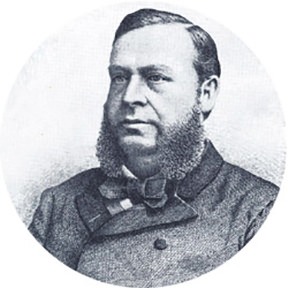
Founder & Principal
1865 – 1896
The day was September 17, 1865, and the clock had yet to strike nine in the morning. Outside, the sun was shining. Inside, a bright, ambitious young man was checking the arrangements of a makeshift classroom in a former music hall on the corner of Eighth and Spring Garden Streets in Philadelphia.
When he was finally satisfied that everything was exactly the way he needed it to be, Thomas May Peirce strode down the second-floor hall, down to ground level and opened the front door. Standing outside was the first class of eager students for Union Business College. Peirce let them inside and showed them a world of opportunities in the form of career-based education.
Peirce College goes by a different name these days. It’s located at 1420 Pine Street instead of Eight and Spring Garden. It now awards associates, bachelors and masters degrees where once it only granted certificates. Its professors even teach students online as well as in the classroom. But one thing has not changed in the 150 years since Thomas May Peirce first opened that door to opportunity: our purpose is educating working adults and preparing them for the careers they deserve.
Thomas May Peirce, who would eventually go on to receive his doctorate in Law and Letters from Dickinson College, was understandably proud of the fact that he’d opened a school unlike almost any other in 1865. He’d done it a mere five months after the Civil War had ended, and he had a strong vision, an unwavering vision to build it into something great.
“I knew from businessmen that advertisements for help were answered by hundreds,and that cases were rare in which more than one percent of the applications rose to the dignity of consideration,”
Peirce would later say of his motivations for opening Union Business College. “I did not have money, but I had time, I had youth, and I had some degree of courage, and I gave myself to the work of training the ninety-nine percent of applicants who wanted to go into business and whose previous preparation did not secure for them even consideration at the hands of an employer.”
Peirce was just 27 when he opened the school, but he had seven years of experience teaching children in Philadelphia’s public schools. He also knew there was a need for business education that institutions of the day were not fulfilling satisfactorily. He staunchly refused to accept the status quo, always searching for better ways to do things.
An eloquent speaker, Peirce was fond of verbalizing this principle. “Let me see your string of fish, and if it is a better-looking string than mine, I want to learn of you and change my methods.”
Throughout his life, Thomas May Peirce was many things: a college founder, a master penman, a dedicated business educator and a grammar school principal among them. But he was nothing if not pragmatic.
“The demand for the merely learned is decreasing. That for the practical and useful is increasing.”
For the 31 years he ran the school until his passing, Peirce’s focus remained on serving his students with the career-oriented practical and useful education they needed. In 2015, the Philadelphia college that bears his name continues that proud tradition.

1608 Walnut Street, Suite 1900
Philadelphia, PA 19103
215.545.6400